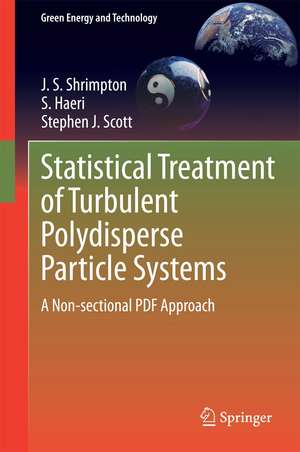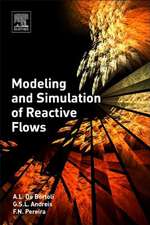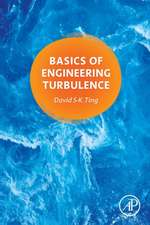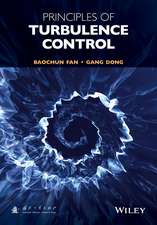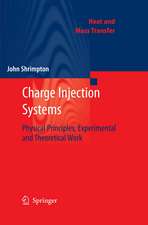Statistical Treatment of Turbulent Polydisperse Particle Systems: A Non-sectional PDF Approach: Green Energy and Technology
Autor J.S. Shrimpton, S. Haeri, Stephen J. Scotten Limba Engleză Hardback – 8 iul 2014
In this book we try to gather the required mathematical knowledge and introduce them more intuitively. Many numerical simulations of basic processes and equation will be given to provide the reader with a physical understanding of the different terms in the underlying equations. We will start the modeling process from a mesoscopic level which deals with the system of an intermediate length scale between the size of the atoms or molecules and the bulk of the material. This provides a unique opportunity for the reader to intuitively add different phenomena to their models and equipped with the necessary mathematical tools derive the final models for their problems.
Din seria Green Energy and Technology
- 18%
 Preț: 943.43 lei
Preț: 943.43 lei - 20%
 Preț: 629.52 lei
Preț: 629.52 lei - 18%
 Preț: 1124.92 lei
Preț: 1124.92 lei - 18%
 Preț: 947.35 lei
Preț: 947.35 lei - 15%
 Preț: 655.92 lei
Preț: 655.92 lei - 18%
 Preț: 957.62 lei
Preț: 957.62 lei - 18%
 Preț: 789.52 lei
Preț: 789.52 lei - 17%
 Preț: 464.56 lei
Preț: 464.56 lei - 15%
 Preț: 645.79 lei
Preț: 645.79 lei - 18%
 Preț: 903.93 lei
Preț: 903.93 lei - 24%
 Preț: 1322.09 lei
Preț: 1322.09 lei - 18%
 Preț: 890.54 lei
Preț: 890.54 lei - 18%
 Preț: 1115.46 lei
Preț: 1115.46 lei - 18%
 Preț: 1117.03 lei
Preț: 1117.03 lei - 18%
 Preț: 949.73 lei
Preț: 949.73 lei - 18%
 Preț: 892.11 lei
Preț: 892.11 lei - 15%
 Preț: 648.24 lei
Preț: 648.24 lei - 18%
 Preț: 997.09 lei
Preț: 997.09 lei - 15%
 Preț: 579.81 lei
Preț: 579.81 lei - 18%
 Preț: 1123.15 lei
Preț: 1123.15 lei - 18%
 Preț: 961.41 lei
Preț: 961.41 lei - 17%
 Preț: 490.23 lei
Preț: 490.23 lei - 18%
 Preț: 904.60 lei
Preț: 904.60 lei - 15%
 Preț: 643.34 lei
Preț: 643.34 lei -
 Preț: 287.91 lei
Preț: 287.91 lei - 24%
 Preț: 634.05 lei
Preț: 634.05 lei -
 Preț: 379.40 lei
Preț: 379.40 lei - 18%
 Preț: 783.20 lei
Preț: 783.20 lei - 18%
 Preț: 1394.84 lei
Preț: 1394.84 lei - 18%
 Preț: 1691.57 lei
Preț: 1691.57 lei - 18%
 Preț: 1112.48 lei
Preț: 1112.48 lei - 15%
 Preț: 592.61 lei
Preț: 592.61 lei - 18%
 Preț: 952.09 lei
Preț: 952.09 lei - 18%
 Preț: 944.19 lei
Preț: 944.19 lei - 18%
 Preț: 891.33 lei
Preț: 891.33 lei - 18%
 Preț: 1252.44 lei
Preț: 1252.44 lei - 18%
 Preț: 789.52 lei
Preț: 789.52 lei - 20%
 Preț: 566.30 lei
Preț: 566.30 lei - 18%
 Preț: 1113.71 lei
Preț: 1113.71 lei - 18%
 Preț: 1114.24 lei
Preț: 1114.24 lei - 24%
 Preț: 590.60 lei
Preț: 590.60 lei - 20%
 Preț: 567.50 lei
Preț: 567.50 lei - 24%
 Preț: 907.50 lei
Preț: 907.50 lei - 18%
 Preț: 952.89 lei
Preț: 952.89 lei - 18%
 Preț: 952.89 lei
Preț: 952.89 lei - 18%
 Preț: 950.52 lei
Preț: 950.52 lei
Preț: 386.99 lei
Nou
Puncte Express: 580
Preț estimativ în valută:
74.06€ • 77.03$ • 61.14£
74.06€ • 77.03$ • 61.14£
Carte tipărită la comandă
Livrare economică 14-28 aprilie
Preluare comenzi: 021 569.72.76
Specificații
ISBN-13: 9781447163435
ISBN-10: 1447163435
Pagini: 136
Ilustrații: XIII, 122 p. 16 illus.
Dimensiuni: 155 x 235 x 13 mm
Greutate: 0.39 kg
Ediția:2014
Editura: SPRINGER LONDON
Colecția Springer
Seria Green Energy and Technology
Locul publicării:London, United Kingdom
ISBN-10: 1447163435
Pagini: 136
Ilustrații: XIII, 122 p. 16 illus.
Dimensiuni: 155 x 235 x 13 mm
Greutate: 0.39 kg
Ediția:2014
Editura: SPRINGER LONDON
Colecția Springer
Seria Green Energy and Technology
Locul publicării:London, United Kingdom
Public țintă
ResearchCuprins
Chapter 1 Introduction.- Chapter 2 PDF Method : A Stochastic Framework.- Chapter 3 Eulerian - Eulerian Field Equations.- Chapter 4 A poly-dispersed EE model.- Chapter 5 Closure Problem.- Chapter 6 PDF Reconstruction Methods.
Notă biografică
Dr. John Shrimpton teaches fluid mechanics in university of Southampton. His main research activities are physics of dense particle systems (i.e. agglomerates and unstable heaps of particles, usually applied to pharmaceutical powder systems), particle-turbulence interactions (clouds, most industrial spray systems) and multiphase systems that contain electric charge (plasma reactors, electrostatic sprays). He uses both experimental methods and optical diagnostics in addition to actively developing several high quality numerical codes for the computational simulation of particle laden flows.
Textul de pe ultima copertă
In this book we will introduce the modeling process of turbulent particulate flows which are encountered in many engineering and environmental applications. These types of flows usually also involve heat and mass transfer and turbulence adds another dimension to the complexity of the problem and hence a rigorous mathematical treatment is usually required. This required mathematical background makes the learning curve for new research students and practicing engineers extremely steep. Therefore modeling process for new or existing problems is extremely slow and is usually restricted to minor improvements to the to the available models.
In this book we try to gather the required mathematical knowledge and introduce them more intuitively. Many numerical simulations of basic processes and equation will be given to provide the reader with a physical understanding of the different terms in the underlying equations. We will start the modeling process from a mesoscopic level which deals with the system of an intermediate length scale between the size of the atoms or molecules and the bulk of the material. This provides a unique opportunity for the reader to intuitively add different phenomena to their models and equipped with the necessary mathematical tools derive the final models for their problems.
In this book we try to gather the required mathematical knowledge and introduce them more intuitively. Many numerical simulations of basic processes and equation will be given to provide the reader with a physical understanding of the different terms in the underlying equations. We will start the modeling process from a mesoscopic level which deals with the system of an intermediate length scale between the size of the atoms or molecules and the bulk of the material. This provides a unique opportunity for the reader to intuitively add different phenomena to their models and equipped with the necessary mathematical tools derive the final models for their problems.
Caracteristici
Presents a unique modeling approach based on the mesoscopic description of the turbulent particulate flows Discusses the ‘closure problem’ and its application to the current framework Provides numerical simulations of basic processes and equations to give the reader with a physical understanding of the different terms in the underlying equations Includes supplementary material: sn.pub/extras
